When Russian Irakly “Ike” Kaveladze became the eighth and last participant identified last week attending Donald Trump Jr.’s June 2016 meeting with Russians in Trump Tower, many wondered if there might be a reason he’d been fingered last.
Turns out, there is. His “legend,” or cover story, cannot withstand close scrutiny. Kaveladze’s lawyer Scott Balber said last week his client attended the Trump Junior meeting with the Russians “just to make sure it happened.”
That would have been an odd mis-use of his talents. Because when Ike Kaveladze attended Donald Trump’s Jr’s meeting with the Russians last year, he brought to the table with him abundant experience with putting together oligarch-to-oligarch deals.
Was that why he was at Trump Towers?
Fake news is not just what gets reported, but what gets left out
In dozens of media profiles of Kaveladze which have appeared since he was identified last Tuesday, a big chunk of his known activity while in the U.S. has somehow been redacted.
Stories profiling Kaverladze begin with the extraordinary tale of congressional investigators discovering his money laundering in 2000.
“Seventeen years ago congressional investigators looking into money laundering stumbled upon an obscure Soviet-born financier who offered ‘special services’ to his Russian clients.”

That’s Ike. Citing a November 2000 Government Accountability Office report, the reports indicated that Kaveladze laundered $1.4 billion through more than 2,000 bank accounts he opened at two U.S. banks for Russian oligarchs.
Back in 2000, Kaveladze had blasted away at investigators using the same “Russian witch hunt” characterization President Trump uses 17 years later.
Now here’s the ‘tricky part. The timeline of Kaveladze’s history in the U.S leaps directly and inexplicably ahead from 2000 to the present. But there is something wrong here.
Kaveladze’s timeline doesn’t match his tick-tock.
“On Tuesday that man, Irakly Kaveladze, resurfaced as the latest foreign ‘guest’ on the ever-expanding list of participants to last year’s June 2016 meeting where Donald Trump Jr was hoping to get damaging information about Hillary Clinton.”
We don’t pretend to know why, but news report to date about the last man identified as being in the room with Donald Trump Jr and Russians and folders with TOP SECRET stickers on them, have all left out Kaveladze’s attendance at The Oligarch’s Ball.
The part they left out
Three years after successfully laundering $1.4 billion for the Russian Mob, Ike Kaveladze surfaced again in 2003. This time he was playing an important role in the sale of a U.S. company, Stillwater Mining, to Russia’s huge Norilsk Mining, which produces nickel, palladium, platinum, copper and cobalt.
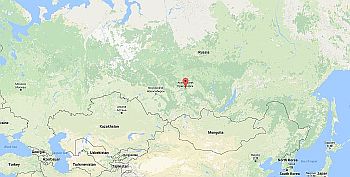 In November 2002, Norilsk of Siberia, which is apparently located at the back-end of nowhere, even though its listed as one of the world’s most polluted places, announced its intention to buy Stillwater Mining of Montana—the U.S.’s only producer of palladium, used in catalytic converters, and found in only three places on the planet: the U.S. Russia, and South Africa— for $341 million.
In November 2002, Norilsk of Siberia, which is apparently located at the back-end of nowhere, even though its listed as one of the world’s most polluted places, announced its intention to buy Stillwater Mining of Montana—the U.S.’s only producer of palladium, used in catalytic converters, and found in only three places on the planet: the U.S. Russia, and South Africa— for $341 million.
Surprisingly, they were very quickly successful in purchasing controlling interest in the company.
The Norilsk-Stillwater deal was unprecedented in its scope and significance. It required strong lobbying in the U.S. with the Federal Trade Commission, and with an inter-agency body called the Committee on Foreign Investment in the U.S., which reviews foreign transactions which may have an effect on U.S. national security.
To help make it happen, President Bush flew to St Petersburg Russia on June 3, 2003 to help his friend Vladimir Putin celebrate his hometown’s 300th birthday. In a lunch in the Konstantin Palace the two men huddled over the terms of the deal.
Along with former Bush officials in the Carlyle Group, the sweetheart deal Kaveladze helped put together nearly passed unnoticed, because of the Iraq War.
But it outraged many industry observers. One of them, Andrew Meier, writing in Harpers magazine in April 2004, called what transpired “The Oligarch’s Ball.”
The subhead: “Washington’s plutocrats court their Russian counterparts.”
Thirst for oil, etc etc.
 Washington-based private equity fund Carlyle Group, which boasted former Bush alumni like James Baker, as well as the former President himself, lost Arab investors after the 9/11 attack, who either withdrew their money or saw it returned when it became impolitic to hang on to.
Washington-based private equity fund Carlyle Group, which boasted former Bush alumni like James Baker, as well as the former President himself, lost Arab investors after the 9/11 attack, who either withdrew their money or saw it returned when it became impolitic to hang on to.
Among them, Meier explained, was Shafiq Bin Laden, one of Osama’s numerous brothers.
America’s thirst for non-Arab oil was increasing exponentially at the same time. It prompted a fundamental shift in U.S. policy towards Russia. The oligarchs came alive, and quickly learned to thrive.
 “They need the oligarchs now more than ever,” said a Moscow financier who has had longtime dealings with Carlyle. “They’re replacing the Bin Laden’s with the Potanin’s and the Khodorkovsky’s.”
“They need the oligarchs now more than ever,” said a Moscow financier who has had longtime dealings with Carlyle. “They’re replacing the Bin Laden’s with the Potanin’s and the Khodorkovsky’s.”
The “Potanin’s” refers to the Kremlin’s favorite oligarch at the time, Vladimir Potanin, a 42-year old banker who, with a second Russian billionaire, Mikhail Prokhorov, jointly controlled the Norilsk metals empire.
Speaking as one oligarch to another
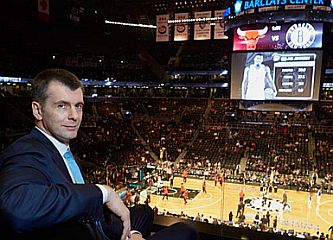 Mikhail Prokhorov has gone on to become the most famous Russian in Brooklyn, no mean feat. He currently owns the NBA’s also-ran Nets.
Mikhail Prokhorov has gone on to become the most famous Russian in Brooklyn, no mean feat. He currently owns the NBA’s also-ran Nets.
Donald Trump’s oligarch-to-oligarch deals may be more brazen, but oligarch-to-oligarch collusion under cover of government diplomacy has apparently been going on longer than many suspected.
“On the subject of oligarchs—the clutch of Russian ‘entrepreneurs’ who had seized the spoils of the Soviet state and become preposterously rich overnight—the governor of Texas railed against their contributions to Russia’s twin epidemics of crime and corruption,” Meier writes in the Oligarch Ball.
“The real fundamental question for Russia,” Bush told Jim Lehrer in 2000, “is what will Russian look like? A market economy? Or one of those economies where a favored few elite are able to put money in their own pockets? And it’s something that we need to be concerned about; something we need to watch very carefully.”
“That approach to the Bush Administration’s dealings with the oligarchs seems not to have lasted long. The administration, its corporate proxies, and even the president’s own father have been waging a campaign to charm the oligarchs, the same “favored few elite” candidates Bush had earlier discerned were the clear and present danger in the Russian morass.”
“Out of an abundance of caution.”
To ensure the historic union, Norilsk hired Baker Botts, the Houston-based law firm run by James A. Baker III. Andrew Meier called it “an instructive example of the oligarch’s new clout in Washington.”
 Norilsk engaged two U.S. lobbyists to smooth the way for federal approval of the deal in the U.S. The men became two of the five nominees to the new Stillwater board of directors.
Norilsk engaged two U.S. lobbyists to smooth the way for federal approval of the deal in the U.S. The men became two of the five nominees to the new Stillwater board of directors.
Atop the list was Craig Fuller, former chief of staff to George H.W. Bush, co-chair of the presidential transition team, and chairman of the 1992 Republican convention.
Largely unknown outside Washington, D.C. Fuller has been called one of the “most important Republicans alive.”
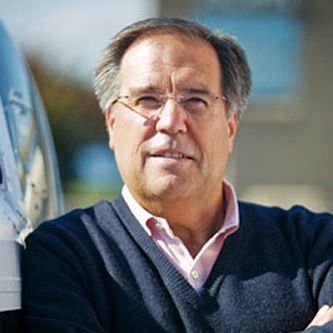 In addition to Fuller, the others were former Democratic Senator Donald W. Riegle Jr., Jack E. Thompson, Vice Chairman of Barrick Gold Corporation; and two experienced lawyers, Steven S. Lucas and Todd D. Schafer.
In addition to Fuller, the others were former Democratic Senator Donald W. Riegle Jr., Jack E. Thompson, Vice Chairman of Barrick Gold Corporation; and two experienced lawyers, Steven S. Lucas and Todd D. Schafer.
But not Ike Kaveladze. A Russian language press release headlined “Norilsk offers Steve Lucas to replace Ike Kaveladze on Stillwater Board” explained why.
“US citizen Irakly Kaveladze, a former classmate of the general director of Norilsk, Mikhail Prokhorov, was mentioned in 2000 in connection with money laundering through the Bank of New York. Therefore the Company decided not to take risks.”
“It’s a theater of financiers.”
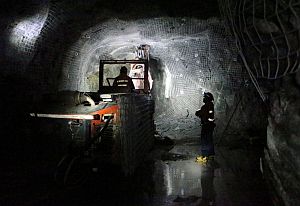 Norilsk and Stillwater controlled over 50% of the palladium in the world. Yet U.S. Federal agencies rolled over and immediately signed off on the deal. The FTC even granted early termination of the waiting period for the transaction, and it closed on June 23, 2003.
Norilsk and Stillwater controlled over 50% of the palladium in the world. Yet U.S. Federal agencies rolled over and immediately signed off on the deal. The FTC even granted early termination of the waiting period for the transaction, and it closed on June 23, 2003.
About the only disgruntled parties were locals in Montana, where the Stillwater mines were located, along with many mining industry analysts. “Just ten years after the Cold War ended, our once-mortal enemy now stands to control half of the world’s supply of palladium with its foot right in America’s heartland,” wrote one.
 In The Oligarch’s Ball” Meier wrote, “Since the days of the Romanov’s trade and commerce, Russia has followed a patriarchal model, in which courtiers who wish to succeed must “kiss the ring,” as Russians like to say.”
In The Oligarch’s Ball” Meier wrote, “Since the days of the Romanov’s trade and commerce, Russia has followed a patriarchal model, in which courtiers who wish to succeed must “kiss the ring,” as Russians like to say.”
“The success of the Russian oligarchs abroad delivers a bitter and familiar lesson. Business and politics have always been inseparable in Russia…
“In America these days, things are not so very different.”
“Ecoutez and repetez!”
Since Kaveladze is a name we’ll be hearing often, getting it’s pronunciation right— it’s Kah-veh-LAHD’-zeh—may well separate the cognoscenti from those occupying cheaper seats in the coming circus.
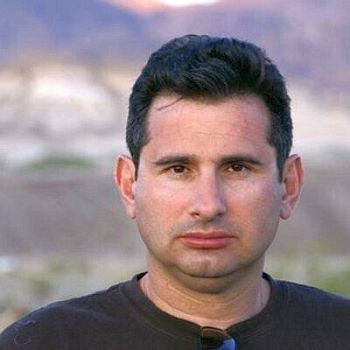 Kaveladze’s lawyer Scott Balber said last week that his client attended the Trump Junior meeting with Russians “just to make sure it happened.”
Kaveladze’s lawyer Scott Balber said last week that his client attended the Trump Junior meeting with Russians “just to make sure it happened.”
Attorney Balber also said his client was “cooperating fully with investigators.”
But there is reason to doubt both statements. Ike himself was incommunicado. Or maybe he’d already fled the country. And attorney Balber often works for Donald Trump. He threatened to sue, on Donald’s behalf, HBO host Bill Maher for likening Trump to an orangutan. Cooler head prevailed.
As to the whereabouts of Ike, it certainly sounds as if he left town in a hurry.
“No one answered the door or the phone at Kaveladze’s three-story home in Huntington Beach,” reported the L.A. Times. “A dresser and other small pieces of furniture sat on the front lawn.”
Stay tuned.
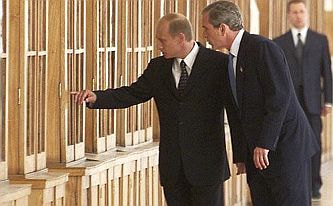
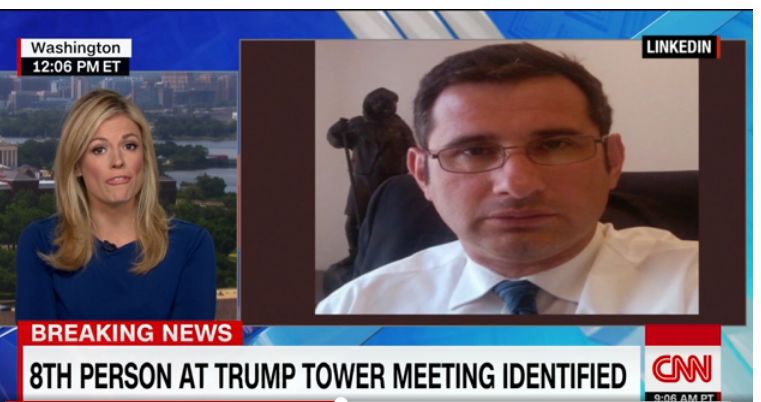


One response to “EXCLUSIVE: “8th Man was part of Putin-Bush ‘Oligarch’s Ball’”
Hello, we spoke a while back. Can I please get in contact with you again. Thank you.